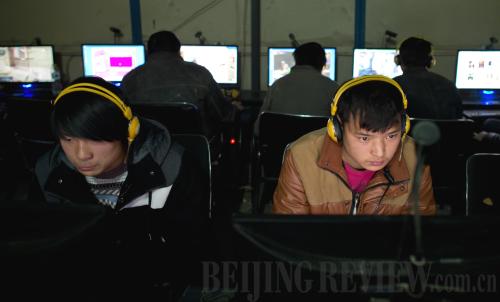|
 |
|
ATTRACTING MORE USERS: Migrant workers surf the Internet at a cybercafe in Chengdu, Sichuan Province (JIANG HONGJING) |
Xiaojun recently lost his job. The cybercafe where he had worked for three years is closed now.
In 2009, Xiaojun came to Beijing after graduating from computer studies at a vocational school in north China's Shanxi Province. He got a job at a cybercafe named Jundu in the city's west end, earning 3,000 yuan ($482.32) a month, plus company-provided accommodation.
Jundu cybercafe, with 200 computers, is considered mid-sized in Beijing. It used to be quite busy. From afternoon to midnight, almost all the computers were occupied. Most of the customers were young people, including migrant workers and secondary school students. They came to the cybercafe to chat online, play games, watch films and surf the net.
However, Xiaojun found that since the beginning of 2012, fewer and fewer people came to the cafe. To attract more customers, the owner offered free drinks and free time cards to access online games but to no avail.
The cybercafe faced high costs, including telecom fees, electricity, rent, wages and taxes. The owner once thought about offering more services but decided against doing so because of his store's location.
In March, the boss told Xiaojun that he had to close the cybercafe after losing money for four straight months.
Li Fuliang is also enduring hardship running his small cybercafe with 50 computers, saying overall it's increasingly difficult for cybercafes to survive.
Li says he now envies the vendor selling sesame cakes outside his cafe. "Running a cybercafe is not even more profitable than selling cakes," he said.
According to the Beijing Administration for Industry and Commerce, there are more than 1,900 cybercafes registered in the city. But these days, a For Sale sign on the storefront has become a common sight.
Impact of smartphones
According to Xiaojun, fewer people frequent cybercafes because of the growing popularity of the smartphone. "Even I'm using a smartphone to chat online," he said.
As the third-generation telecom networks develop rapidly and smartphones become much cheaper, more people are using smartphones—and hardly for making phone calls. Connecting to the Internet at any time and any place has become a norm for today's youth.
Smartphones are also changing lifestyles. Users today are connecting to the Internet on buses, in the subway and even at the dinner table. It's more convenient to browse the Web, chat and play games on a smartphone than it is to meander over to the neighborhood cybercafe.
According to a report released by txwm.com on April 18, by the end of June 2012 China had 538 million netizens, of whom 388 million were accessing the Web through their phones. Li also believes another reason for the drop in visitors to cybercafes has to do with the government's ban on people under the age of 18 from entering.
Li says in 2000 and 2001, most cybercafes charged 8-10 yuan ($1.29-1.61) per hour for using a computer. But in recent years, as competition intensified, most cybercafes began charging a mere 1.5-2 yuan ($0.24-0.32) per hour. According to Li's estimation, for a cybercafe with 50 computers, the hourly cost for each computer is 1.5 yuan.
| 